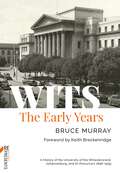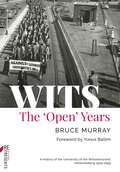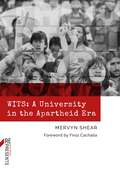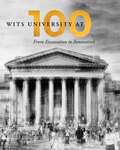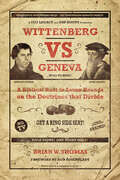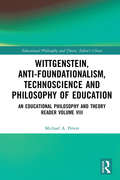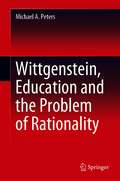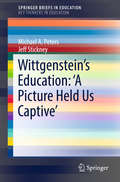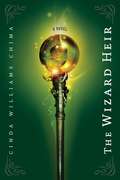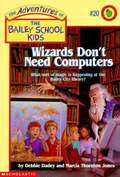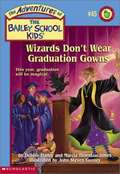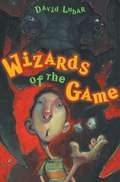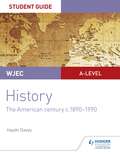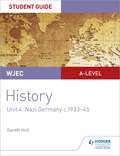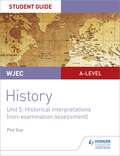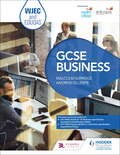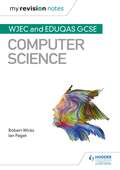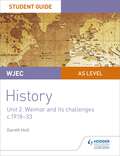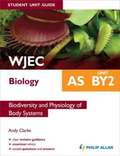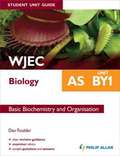- Table View
- List View
WITS: A History of the University of the Witwatersrand, Johannesburg, and its Precursors 1896-1939
by Bruce MurrayWITS: The Early Years is a history of the University up to 1939. First established in 1922, the University of the Witwatersrand, Johannesburg developed out of the South African School of Mines in Kimberley circa 1896. Examining the historical foundations, the struggle to establish a university in Johannesburg, and the progress of the University in the two decades prior to World War II, historian Bruce Murray captures the quality and texture of life in the early years of Wits University and the personalities who enlivened it and contributed to its growth.Particular attention is given to the wider issues and the challenges which faced Wits in its formative years. The book examines the role Wits came to occupy as a major centre of liberal thought and criticism in South Africa, its contribution to the development of the professions of the country, the relationship of its research to the wider society, and its attempts to grapple with a range of peculiarly South African problems, such as the admission of black students to the University and the relations of English- and Afrikaans-speaking white students within it.This edition of WITS: The Early Years is republished in the University’s centenary year with a preface by Keith Breckenridge, who writes, ‘In the republication of Murray’s two volume history of Wits, readers have an opportunity to explore the often dramatic and contested story of this university … Murray produced an intimate, almost scandalous intellectual history of the institution that served as his home for practically half a century.’
WITS: A History of the University of the Witwatersrand, Johannesburg 1939-1959
by Bruce MurrayIn the period between the outbreak of World War II in 1939 and the enactment of university apartheid by the Nationalist Government in 1959, the University of the Witwatersrand, Johannesburg (Wits) developed as an ‘open university’, admitting students of all races. This, the second volume of the history of Wits by historian Bruce Murray, has as its central theme the process by which Wits became ‘open’, the compromises this process entailed, and the defence the University mounted to preserve its ‘open’ status in the face of the challenges posed by the Nationalist Government.The University’s institutional autonomy is highlighted by Yunus Ballim in his preface to the centenary edition of WITS: The ‘Open’ Years. He writes: ‘The emerging posture of a university willing to rise in defence of academic freedom was important because this was to become infused into the institutional culture of Wits.’The book looks at the University’s role in South Africa’s war effort, its contribution to the education of ex-volunteers after the war, its leading role in training job-seeking professionals required by a rapidly expanding economy, and the rise of research and postgraduate study. Students feature prominently through their political activities, the flourishing of a student intelligentsia, the heyday of the Remember and Give (Rag) parade, rugby intervarsity, and the stunning success of Wits sportsmen and women. WITS: The ‘Open’ Years paints a vivid picture of the range of personalities who enlivened the campus – among them some well-known figures in the new South Africa.The book includes chapters by Alf Stadler, who was Professor of Political Studies at Wits and the author of The Political Economy of Modern South Africa, and Jonty Winch, former Sports Officer at Wits and the author of Wits Sport.
WITS: A University in the Apartheid Era
by Mervyn ShearWhen the National Government assumed power in 1948, one of the earliest moves was to introduce segregated education. Its threats to restrict the admission of black students into the four ‘open universities’ galvanised the staff and students of those institutions to oppose any attempt to interfere with their autonomy and freedom to decide who should be admitted. In subsequent years, as the regime adopted increasingly oppressive measures to prop up the apartheid state, opposition on the campuses, and in the country, increased and burgeoned into a Mass Democratic Movement intent on making the country ungovernable. Protest escalated through successive states of emergency and clashes with police on campus became regular events. Residences were raided, student leaders were harassed by security police and many students and some staff were detained for lengthy periods without recourse to the courts. First published in 1996, WITS: A University in the Apartheid Era by Mervyn Shear tells the story of how the University of the Witwatersrand (Wits) adapted to the political and social developments in South Africa under apartheid. This new edition is published in the University’s centenary year with a preface by Firoz Cachalia, one of Wits’ student leaders in the 1980s. It serves as an invaluable historical resource on questions about the relationship between the University and the state, and on understanding the University’s place and identity in a constitutional democracy.
Wits University at 100: From Excavation to Innovation
by University of WitwatersrandMaps the university’s current and future vision as it marks its centenary in 2022The University of the Witwatersrand occupies a special place in the hearts and minds of South Africans. It is a leading university renowned for its commitment to academic excellence, social justice and the advancement of the public good. Its history is inextricably linked with the development of Johannesburg, with mining and economic development, and with political and social activism across the country. Wits University at 100: From Excavation to Innovation captures important moments of Wits’ story in celebration of the university’s centenary in 2022. It explores Wits’ origins, the space and place that it occupies in society, and its transformation as it prepares the ground for the next century. From its humble beginnings as a mining college in Johannesburg to its current position as a flourishing and inclusive university, Wits University at 100 is a story of innovation driven from the global South. In text and image, Wits is presented as a dynamic institution that thrives because of its people, many of whom, in one way or another, have shifted the world. The experiences, achievements and insights of past and present ‘Witsies’ come alive in this glossy, full-color book that maps the university’s vision for the future.
Wittenberg Vs. Geneva: A Biblical Bout in Seven Rounds on the Doctrines that Divide
by Brian William ThomasWhat are the differences between Lutherans and Calvinists, and do they really matter? In Wittenberg vs. Geneva, Brian Thomas provides a biblical defense of the key doctrines that have divided the Lutheran and Reformed traditions for nearly five centuries.It is especially written to help those who may have an interest in the Lutheran church, but are concerned that her stance on doctrines like predestination or the sacraments may not have biblical support. To get to the heart of the matter, Pastor Thomas focuses solely upon those crucial scriptural texts that have led Lutheran and Reformed scholars down different paths to disparate conclusions as he spars with popular Calvinist theologians from the past and the present.
Wittgenstein, Anti-foundationalism, Technoscience and Philosophy of Education: An Educational Philosophy and Theory Reader Volume VIII (Educational Philosophy and Theory: Editor’s Choice)
by Michael A. PetersThis book is a collection of essays motivated by a "cultural" and biographical reading of Wittgenstein. It includes some new essays and some that were originally published in Educational Philosophy and Theory. The book focuses on the concept of “technoscience”, and the relevance of Wittgenstein’s work for philosophy of technology which amplifies Lyotard’s reading and provides a critique of education as an increasingly technology-led enterprise. It includes a distinctive view on the ethics of reading Wittgenstein and the ethics of suicide that shaped him. It also examines the reception and engagement with Wittgenstein’s work in French philosophy with a chapter on post-analytic philosophy of education as a choice between Richard Rorty and Jean-François Lyotard. Peters examines Wittgenstein’s academic life at Cambridge University and his involvement as a student and faculty member in the Moral Sciences Club. Finally, the book provides an understanding of Wittgensteinian styles of reasoning and the concept of worldview. Is it possible to escape the picture that holds us captive? This constitutes a challenging introduction to Wittgenstein’s work for academics, researchers and postgraduate students in the fields of education, technology and philosophy.
Wittgenstein, Education and the Problem of Rationality
by Michael A. PetersThis book develops an argument for a historicist and non-foundationalist notion of rationality based on an interpretation of Wittgenstein of the Philosophical Investigations and On Certainty. The book examines two notions of rationality—a universal versus a constitutive conception – and their significance for educational theory. The former advanced by analytic philosophy of education as a form of conceptual analysis is based on a mistaken reading of Wittgenstein. Analytic philosophy of education used a reading of Wittgenstein’s philosophy of language to set up and justify an absolute, universal and ahistorical notion of rationality. By contrast, the book examines the underlying influence of the later Wittgenstein on the historicist turn in philosophy of science as a basis for a non-foundationalist and constitutive notion of rationality which is both historical and cultural, and remains consistent with wider developments in philosophy, hermeneutics and social theory. This book aims to understand the philosophical motivation behind this view, to examine its intellectual underpinnings and to substitute this universal conception of rationality by reference to a Hegelian interpretation of the later Wittgenstein that emphasizes his status as an anti-foundational thinker.
Wittgenstein’s Education: 'A Picture Held Us Captive’
by Michael A. Peters Jeff StickneyDedicated to educators who are not philosophy specialists, this book offers an overview of the connections between Wittgenstein’s later philosophy and his own training and practice as an educator. Arguing for the centrality of education to Wittgenstein’s life and works, the authors resist any reduction of Wittgenstein’s philosophy to remarks on pedagogy while addressing the current controversy surrounding the role of training in the enculturation process. Significant events in his education and life are examined as the background for successful interpretation, without lending biographical details explanatory force. The book discusses the importance of Wittgenstein’s training and dismissal as an elementary teacher (1920-26) in light of his later, frequent use (1930s-40s) of many ‘scenes of instruction’ in his Cambridge lectures and notebooks. These depictions culminated in his now famous Philosophical Investigations -- a counter to his earlier philosophy in the Tractatus. Wittgenstein came to distinguish between empirical inquiries into how education, language or mathematics might ideally work, from grammatical studies of how we learn on the rough ground to normatively go-on as others do – often without explicit rules and with considerable degrees of ambiguity, for instance, in implementing new guidelines during a curriculum reform or in evaluating teachers. The book argues that Wittgenstein’s reflections on education -- spanning from mathematics training to the acquisition of language and cultivation of aesthetic appreciation -- are of central significance to both the man and his pedagogical style of philosophy.
The Wizard Heir (Heir Series Book #2)
by Cinda Williams ChimaSixteen-year-old Seph McCauley has spent the past three years getting kicked out of one exclusive private school after another. Seph is a wizard, orphaned and untrained, and his powers are escalating out of control.
Wizards Don't Need Computers (The Adventures of the Bailey School kids #20)
by Marcia Thornton Jones Debbie DadeyThere are some pretty weird grownups living in Bailey City. But could the new librarian who has a long white beard and a magic wand really be Merlin, the great wizard from medieval times? The Bailey School Kids are going to find out! "I just realized that Mr. Merle's name sounds like Merlin," said Liza. Melody's eyes were big. "And his fish's name is Arthur, as in King Arthur!" "Maybe Mr. Merle is Merlin," Howie said. Liza and Melody gulped, but Eddie just laughed. "Wizards use magic to get whatever they want. Theydon't have to work in libraries shelving books. And they definitely don't need computers!"
Wizards Don't Wear Graduation Gowns (The Adventures of the Bailey School Kids #45)
by Debbie Dadey Marcia Thornton JonesFrom the book jacket: There are some pretty weird grownups living in Bailey City. But could the new assistant principal really be a wizard who wants to turn everyone at graduation intoan animal? The Bailey School Kids are going to find out! "Howie is not right," Eddie said. "A person cannot be turned into a bird and an assistant principal cannot be a wizard, especially when she's a girl. Mrs. Jhick is not a wizard and she can't make anybody do anything." "Oh, yeah?" Howie asked. "Then tell Melody she's a nincompoop!" "Gladly," Eddie said with a smirk. He turned to Melody. He opened his mouth. Nothing came out."See?" Howie said. "Mrs. Jhick cast a spell on you and now you can't insult your friends." Eddie put his hands on his cheeks. "This is horrible," Eddie gasped. "It's terrible. It's the end of the world. That wizette must be stopped!" RL3 007-010
Wizards of the Game
by David LubarEighth-grader Mercer, whose passion is the fantasy role-playing game Wizards of the Warrior World, hopes to use a fund-raiser to bring a gaming convention to his middle school.
WJEC A-level History Student Guide Unit 3: The American century c.1890-1990
by Haydn DaveyExam board: WJECLevel: AS/A-levelSubject: HistoryFirst teaching: September 2015First exams: Summer 2016 (AS); Summer 2017 (A-level)Build, reinforce and revise the historical knowledge and exam skills required for WJEC AS/A-level History.Matched to the 2016 specification for Wales, this study guide contains clear content summaries and annotated sample answers to exam questions.- Concisely covers the key issues and content in the specification, breaking the Unit down into manageable chunks- Consolidates understanding with regular knowledge-check questions, plus useful tips- Builds the analytical and evaluative skills that students need to succeed in AS/A-level History- Improves students' exam technique, providing sample student answers to past paper questions, with commentary to explain the number of marks awarded- Helps students to learn the content throughout the course, study independently and revise for their exams
WJEC A-level History Student Guide Unit 4: Nazi Germany Epub
by Gareth HoltExam board: WJECLevel: AS/A-levelSubject: HistoryFirst teaching: September 2015First exams: Summer 2016 (AS); Summer 2017 (A-level)Build, reinforce and revise the historical knowledge and exam skills required for WJEC AS/A-level History.Matched to the 2016 specification for Wales, this study guide contains clear content summaries and annotated sample answers to exam questions.- Concisely covers the key issues and content in the specification, breaking the Unit down into manageable chunks- Consolidates understanding with regular knowledge-check questions, plus useful tips- Builds the analytical and evaluative skills that students need to succeed in AS/A-level History- Improves students' exam technique, providing sample student answers to past paper questions, with commentary to explain the number of marks awarded- Helps students to learn the content throughout the course, study independently and revise for their exams
WJEC A-level History Student Guide Unit 4: Nazi Germany c.1933-1945
by Gareth HoltExam board: WJECLevel: AS/A-levelSubject: HistoryFirst teaching: September 2015First exams: Summer 2016 (AS); Summer 2017 (A-level)Build, reinforce and revise the historical knowledge and exam skills required for WJEC AS/A-level History.Matched to the 2016 specification for Wales, this study guide contains clear content summaries and annotated sample answers to exam questions.- Concisely covers the key issues and content in the specification, breaking the Unit down into manageable chunks- Consolidates understanding with regular knowledge-check questions, plus useful tips- Builds the analytical and evaluative skills that students need to succeed in AS/A-level History- Improves students' exam technique, providing sample student answers to past paper questions, with commentary to explain the number of marks awarded- Helps students to learn the content throughout the course, study independently and revise for their exams
WJEC A-level History Student Guide Unit 4: Nazi Germany c.1933-1945
by Gareth HoltExam board: WJECLevel: AS/A-levelSubject: HistoryFirst teaching: September 2015First exams: Summer 2016 (AS); Summer 2017 (A-level)Build, reinforce and revise the historical knowledge and exam skills required for WJEC AS/A-level History.Matched to the 2016 specification for Wales, this study guide contains clear content summaries and annotated sample answers to exam questions.- Concisely covers the key issues and content in the specification, breaking the Unit down into manageable chunks- Consolidates understanding with regular knowledge-check questions, plus useful tips- Builds the analytical and evaluative skills that students need to succeed in AS/A-level History- Improves students' exam technique, providing sample student answers to past paper questions, with commentary to explain the number of marks awarded- Helps students to learn the content throughout the course, study independently and revise for their exams
WJEC A-level History Student Guide Unit 5: Historical Interpretations (non-examination assessment)
by Phil StarExam board: WJECLevel: AS/A-levelSubject: HistoryFirst teaching: September 2015First exams: Summer 2016 (AS); Summer 2017 (A-level)Maximise your chance of coursework success with this step-by-step guide to the WJEC A-level History NEA.- Explains how to understand, approach and successfully answer the question/essay title, with tips to highlight important information and common pitfalls- Develops students' skills in analysing and evaluating primary source material- Teaches students how to identify and test the validity of historical interpretations- Offers extensive advice on essay writing, including drafting an effective introduction and conclusion- Provides one complete example of the NEA with annotations/commentary that show how it could be improved- Keeps students on track as they complete activities that help to structure their progress
WJEC A-level History Student Guide Unit 5: Historical Interpretations (non-examination assessment)
by Phil StarExam board: WJECLevel: AS/A-levelSubject: HistoryFirst teaching: September 2015First exams: Summer 2016 (AS); Summer 2017 (A-level)Maximise your chance of coursework success with this step-by-step guide to the WJEC A-level History NEA.- Explains how to understand, approach and successfully answer the question/essay title, with tips to highlight important information and common pitfalls- Develops students' skills in analysing and evaluating primary source material- Teaches students how to identify and test the validity of historical interpretations- Offers extensive advice on essay writing, including drafting an effective introduction and conclusion- Provides one complete example of the NEA with annotations/commentary that show how it could be improved- Keeps students on track as they complete activities that help to structure their progress
WJEC and Eduqas GCSE Business
by Malcolm Surridge Andrew GillespieExam Board: WJECLevel: GCSESubject: BusinessFirst Teaching: September 2017First Exam: June 2019Endorsed by WJEC/EduqasEnsure that every student can fulfil their potential with this tailor-made Student Book for the 2017 specifications; our bestselling Business authors develop knowledge and skills through clear explanations, real-life examples and assessment practice questions.- Builds understanding of business concepts through accessible explanations, supported by definitions of key terms and tips that highlight important points and common misconceptions- Enables students to apply their knowledge to real business examples, issues and contexts in the 'Business insight' feature- Develops investigative, analytical and evaluation skills through multiple choice, short answer and case study/data response questions, sample answers and commentary- Encourages students to track their progress using learning outcomes, end-of-chapter summaries and knowledge-check questions- Helps students practise and improve their quantitative skills via the 'Maths moment' feature- Stretches students with questions that test their ability to make an informed judgementThis book covers the content of:- 2017 WJEC GCSE (A*-G) Business specification regulated by Qualifications Wales- 2017 WJEC Eduqas GCSE (9-1) Business specification regulated by Ofqual
WJEC and Eduqas GCSE Computer Science (My Revision Notes)
by Robert Wicks Ian PagetExam board: WJECLevel: GCSESubject: Computer ScienceFirst teaching: September 2017First exams: Summer 2019Strengthen your students' understanding and upgrade their confidence with My Revision Notes: WJEC Eduqas GCSE (9-1) Computer Science.Written by leading Computer Science experts this is the only revision guide aimed specifically at helping students prepare for the WJEC or Eduqas exam - a new title in the top-selling revision guide series, loved by students and recommended by teachers.· Let students take control of their revision - plan and focus on the areas where they need to improve their knowledge and understanding with advice and summaries from the experts.· Help them achieve their potential - exam tips on computer science terms and concepts highlighted throughout the book· Improve their exam skills - a range of exam practice questions and 'test yourself questions' with answers at the back of the book.
WJEC AS-level History Student Guide Unit 2: Weimar And Its Challenges Epub
by Gareth HoltExam board: WJECLevel: AS/A-levelSubject: HistoryFirst teaching: September 2015First exams: Summer 2016 (AS); Summer 2017 (A-level)Build, reinforce and revise the historical knowledge and exam skills required for WJEC AS/A-level History.Matched to the 2016 specification for Wales, this study guide contains clear content summaries and annotated sample answers to exam questions.- Concisely covers the key issues and content in the specification, breaking the Unit down into manageable chunks- Consolidates understanding with regular knowledge-check questions, plus useful tips- Builds the analytical and evaluative skills that students need to succeed in AS/A-level History- Improves students' exam technique, providing sample student answers to past paper questions, with commentary to explain the number of marks awarded- Helps students to learn the content throughout the course, study independently and revise for their exams
WJEC AS-level History Student Guide Unit 2: Weimar and its challenges c.1918-1933
by Gareth HoltExam board: WJECLevel: AS/A-levelSubject: HistoryFirst teaching: September 2015First exams: Summer 2016 (AS); Summer 2017 (A-level)Build, reinforce and revise the historical knowledge and exam skills required for WJEC AS/A-level History.Matched to the 2016 specification for Wales, this study guide contains clear content summaries and annotated sample answers to exam questions.- Concisely covers the key issues and content in the specification, breaking the Unit down into manageable chunks- Consolidates understanding with regular knowledge-check questions, plus useful tips- Builds the analytical and evaluative skills that students need to succeed in AS/A-level History- Improves students' exam technique, providing sample student answers to past paper questions, with commentary to explain the number of marks awarded- Helps students to learn the content throughout the course, study independently and revise for their exams
WJEC AS-level History Student Guide Unit 2: Weimar and its challenges c.1918-1933
by Gareth HoltExam board: WJECLevel: AS/A-levelSubject: HistoryFirst teaching: September 2015First exams: Summer 2016 (AS); Summer 2017 (A-level)Build, reinforce and revise the historical knowledge and exam skills required for WJEC AS/A-level History.Matched to the 2016 specification for Wales, this study guide contains clear content summaries and annotated sample answers to exam questions.- Concisely covers the key issues and content in the specification, breaking the Unit down into manageable chunks- Consolidates understanding with regular knowledge-check questions, plus useful tips- Builds the analytical and evaluative skills that students need to succeed in AS/A-level History- Improves students' exam technique, providing sample student answers to past paper questions, with commentary to explain the number of marks awarded- Helps students to learn the content throughout the course, study independently and revise for their exams
WJEC Biology AS Student Unit Guide: Unit BY2 eBook Pub Biodiversity and Physiology of Body Systems
by Andy ClarkePerfect for revision, these guides explain the unit requirements, summarise the content and include specimen questions with graded answers.Endorsed by WJEC, this full-colour Student Unit Guide provides ideal preparation for your unit exam:Feel confident you understand the unit: each guide comprehensively covers the unit content and includes topic summaries, knowledge check questions and a reference indexGet to grips with the exam requirements: the specific skills on which you will be tested are explored and explainedAnalyse exam-style questions: graded student responses will help you focus on areas where you can improve your exam technique and performance
WJEC Biology AS Student Unit Guide: Unit BY1 eBook ePub Basic Biochemistry and organisation
by Dan Foulder Asuman Celen PollardPerfect for revision, these guides explain the unit requirements, summarise the content and include specimen questions with graded answers.Endorsed by WJEC, this full-colour Student Unit Guide provides ideal preparation for your unit exam:Feel confident you understand the unit: each guide comprehensively covers the unit content and includes topic summaries, knowledge check questions and a reference indexGet to grips with the exam requirements: the specific skills on which you will be tested are explored and explainedAnalyse exam-style questions: graded student responses will help you focus on areas where you can improve your exam technique and performance
